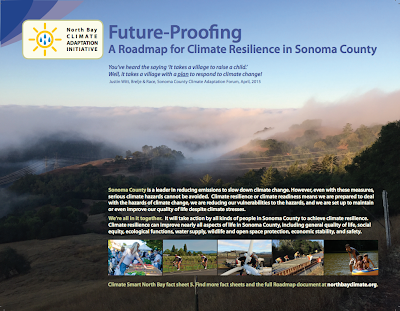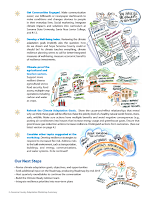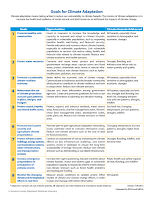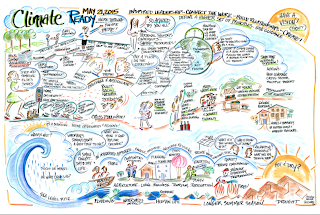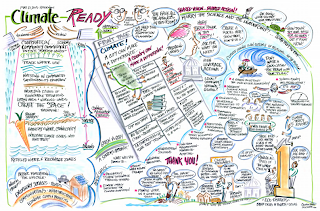|
|
Announcements
Climate Resilience Focus Groups Results
|
NBCAI conducted three focus groups after the 2015 Sonoma County Adaptation Workshop to drill down on key issues: Vulnerable Communities, Agriculture and Food Security, and Forests and Fire. Read their input here: |
A Roadmap for Climate Resilience in Sonoma County
|
A roadmap to where? Just as climate hazards affect nearly every aspect of life in Sonoma County, climate resilience solutions are everywhere. But which actions are most important, by which actors, to achieve the most important climate resilience goals? The Climate Resilience Roadmap is стоит ли оформлять самозанятость of how all types of actors in Sonoma County can do their part to achieve climate resilience. It’s a plan that facilitates and documents a shared understanding of climate resilience needs and roles, so that collectively we are creating an effective, comprehensive response to the climate threats facing Sonoma County.
View the Roadmap for Climate Resilience in Sonoma County.
View the Roadmap Factsheet.
|
Partner project: Climate Ready North Bay
|
What is North Bay Climate Ready? To create a framework for adapting to climate change, decision-makers working in Northern California’s watersheds need to define climate vulnerabilities in the context of site-specific opportunities and constraints relative to water supply, land use suitability, wildfire risks, ecosystem services, biodiversity, and quality of life. Working in partnership with the Sonoma County Regional Climate Protection Authority (RCPA) and the North Bay Climate Adaptation Initiative (NBCAI), Pepperwood’s Terrestrial Biodiversity Climate Change Collaborative (TBC3.org) has developed customized climate vulnerability assessments with select natural resource agencies of California’s Sonoma, Marin, Napa and Mendocino counties via “Climate Ready North Bay,” a public-private partnership funded by the California Coastal Conservancy’s Climate Ready program.
The goal of Climate Ready North Bay is to engage natural resource agencies, including water agencies, parks, and open space districts, and other municipal users to collaboratively design climate vulnerability information products specific to their jurisdictions, mandates, and management priorities. With agency input guiding the development of the vulnerability assessments, spatially-explicit data products are now available to help local governments and agency staff implement informed and effective climate adaptation strategies. These products include customized maps, graphs, and summary technical reports tailored to site-specific resource management challenges, located within specific North Bay watersheds. Project Partners: North Bay Climate Ready is a project by the Terrestrial Biodiversity Climate Change Consortium (TBC3). Project partners are California Coastal Conservancy; North Bay Climate Adaptation Initiative; Sonoma County’s Regional Climate Protection Authority, Water Agency, Regional Parks, and Agricultural Protection and Open Space District; Napa County; Marin Municipal Water District; Mendocino Flood Protection and Water Conservation District. Project Funders: California Coastal Conservancy, Sonoma County Water Agency, Marin Municipal Water District, Napa County, Gordon and Betty Moore Foundation. |
Slideshow: Climate vulnerabilities and climate resilience strategies
|
View the "Climate vulnerabilities and climate resilience strategies" presentation.
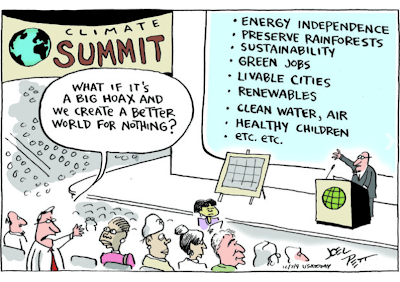 |
Sonoma County Adaptation Forum and Workshop
|
Almost 300 people participated in these events in 2015 to understand our climate vulnerabilities and prioritize strategies for climate resilience. View the pictorial summary. Videos of speakers, event photos, and audio files are available at the Forum website.
|
Climate Ready Sonoma County: Climate Hazards and Vulnerabilities
|
See the Climate Hazards and Vulnerabilities Assessment here.
The purpose of this climate vulnerability assessment is to provide an initial screening of the county’s community resources that are vulnerable to climate change hazards. It is not intended to be a comprehensive vulnerability analysis or to provide site-specific prescriptions for action. Instead, the intent is to provide a starting point for a countywide discussion on climate impacts and our vulnerabilities to climate change. We hope it serves as a guide for elected officials, planners, engineers, land managers, and others in assessing risk from climate hazards and identifying strategies to reduce risk. It was developed as part of a broader planning framework called Climate Action 2020 to identify and implement specific, high-priority strategies to respond to the climate crisis here in Sonoma County.
|
Climate-Smart North Bay Fact Sheets
|
Read the Climate-Smart North Bay Fact Sheets here. Toward its mission to educate the North Bay community about the impacts of climate change on the region and appropriate adaptation measures that can be taken by individuals and organizations, NBCAI has published a series of fact sheets called "Climate Ready North Bay." There is a fact sheet providing a summary of current climate change science, and fact sheets for forest management, riparian stewardship, and policy.
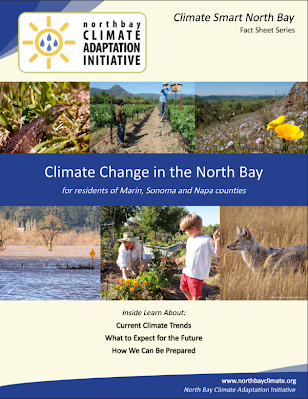 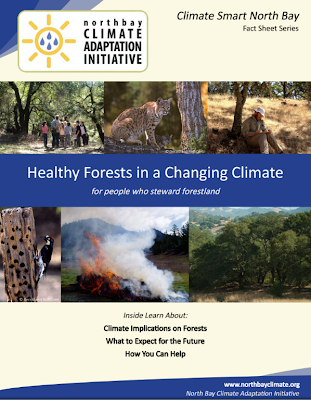 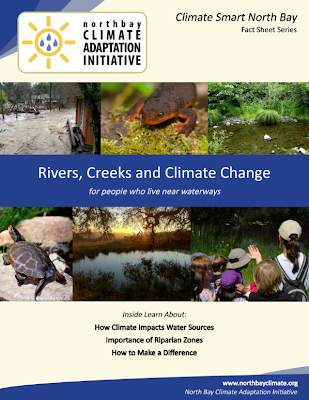 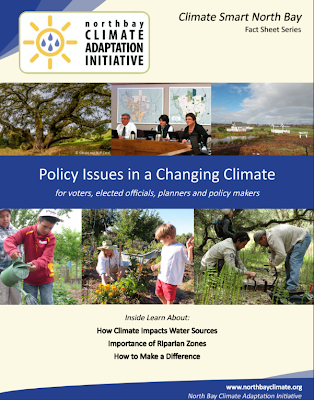
|
Read the May 21 Workshop Proceedings
|
Follow this link to read the May 21 Workshop Proceedings and provide us with your thoughts.
|
LandSmart™ integrates carbon farm planning into its conservation effort, across three north bay counties and an array of agricultural land use types
|
LandSmart™ is a regional conservation planning program in Napa, Sonoma, and Mendocino Counties that helps land managers meet their natural resource management goals while supporting productive land, thriving streams, and on-farm wildlife habitat. The carbon farm planning project recognizes that as much as one-third of the surplus CO2 in the atmosphere driving climate change has resulted from land management practices on agricultural lands. Carbon farming can capture carbon in the soil and plant material, while enhancing soil health and productivity. What strategies are in the carbon farming tool belt?
The project will allow the LandSmart™ partners to develop a carbon planning component to the standard LandSmart™ plans. LandSmart™ was developed by Resource Conservation Districts in all four North Bay counties with the USDA Natural Resources Conservation Service, land managers, and resource agencies. |
Reflections on the National Adaptation Forum
 For me personally, I had a lot of thoughts and feelings about the Forum. The sessions on indicators were enticing, but also frustrating because of the relatively nascent state of the field of practice here. A session that highlighted several frameworks left me with way more questions than answers. It is clear to me we need a standard of practice in measurement and a protocol for decision support that is reasonable for local governments and others to use, but somehow integrates the vast and complex body of data that is needed to inform such decisions and plans. Such a resource is obviously expensive to produce, and is not something that can or should be developed by a small or local entity. Can we imagine the state or federal government developing a tool that can manage the necessary complexity without breaking down the capacities and resources of the folks who need the results so desperately? I was also drawn to presentations that focused on how to communicate about climate change to diverse audiences and how to bring together key stakeholders to work on adaptation at the local level. In particular, I got a lot out of a session on a community in North Carolina that looked at ways to combine Hazard Mitigation Planning with Economic Development Planning in ways that leverage the approaches and expertise of these distinct plans to improve both efforts. To me, this session highlighted how some relatively modest coordination and cross-sector engagement can avoid a lot of duplication and potentially unlocks new methods and value systems that can greatly benefit the end product. Of course at an event like this, there's an immense amount of value in the conversations throughout the venue. I particularly enjoyed spending time with the many Californians who came to St. Louis, as it provided some focused time to talk about our own needs and reflect on how much we are doing, while also challenging us to do more in the coming years. As the lead organizer for the California Adaptation Forum, I was also inspired to raise the bar for 2016. In the coming months as we get into planning more earnestly, I know I will be thinking about how to bring more to attendees but also how we can ask more of them so our momentum can continue to build. Finally, as I noted in the Sonoma Forum meeting last week, I spent a lot of time in St. Louis wondering about the balance between a national venue for adaptation conversations and more local ones. As was so clear on your first forum day and even more on the second day as folks dove so deep into Sonoma County issues and strategies, adapting to climate change requires breaking down silos and building new solutions - at home. I think we need a national event. For now the field is way too immature not to bring folks together nationally. We will always need to know what is happening across the country and meet with colleagues on some level. But I imagine that overtime the role for national discussions like this will evolve, perhaps towards a leadership / strategy convening for the movement as a whole, rather than the place to get access to local case studies and practitioners (which we hope become more visible through other means). So overall, a great experience and one that gave me lots of food for thought. I look forward to building on the relationships from the event and working even more strongly with the ones I already have.” Kif Scheuer Climate Change Program Director Local Government Commission kscheuer@lgc.org https://twitter.com/kscheuer https://www.linkedin.com/pub/kif-scheuer/3/882/63 |

